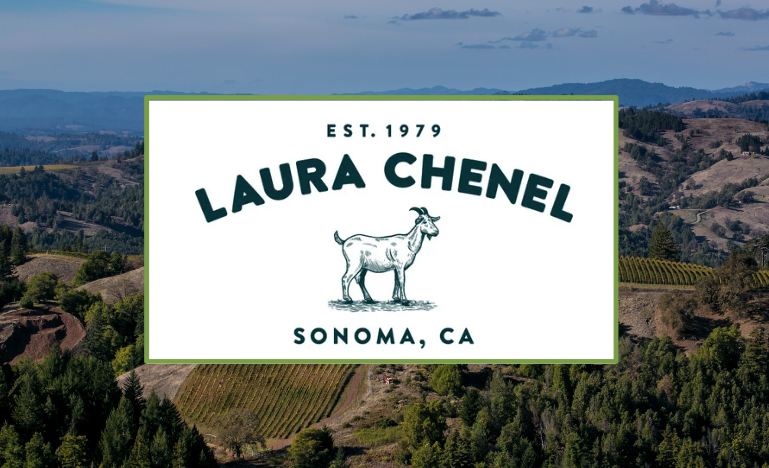Sonoma County Wine and Cheese Have Always Gone Together
By Virginie Boone
The popular adage that what grows together goes together is perfectly demonstrated in the dreamy partnership between Sonoma County cheese and wine.
What makes this region so successful at growing wine grapes– the temperate Mediterranean/coastal climate, legacy of multigenerational farming, rich tectonic soils and proximity to the larger Bay Area’s dynamic food and wine scene – similarly support a robust and world-renowned cheesemaking industry. And like vineyards, maintaining pasturelands for milk-producing animals helps keep land in agriculture.
Cheesemaking in California goes back as far as the Spanish missions, much like wine, with Father Junipero Serra introducing both winegrapes and dairy cows to the region.
The Gold Rush brought population growth, particularly from Europe immigrants, who developed dairies to supply milk, cheese and butter to places like San Francisco. Today, California makes more than 2 billion pounds of cheese annually – 25% of America’s total – sourcing milk from cows, sheep, goat and water buffalo to make a vast variety of types.
In 1857 Clara Steele set up the first commercial dairy in the United States, a 6,000-acre farm in Point Reyes where she started making her own cheese, too. Her family later brought cheesemaking to Pescadero on the San Mateo coast.
The Marin and Sonoma coasts were a particularly attractive milkshed, thanks to the cool coastal climate and abundant grasslands, and creameries soon followed. The Marin French Cheese Factory on Point Reyes-Petaluma Road west of Petaluma dates back to Jefferson and Matilda Thompson, who traveled west to California by wagon train in the early 1850s.
Buying land in 1865, the 700-acre Thompson Ranch housed a cheese factory, herd of dairy cows and one-room grammar school. Their big hits were Breakfast Cheese (now known as Petite Breakfast), a bar cheese made from the remnants of making butter, and Rouge et Noir, a Camembert, both soft-ripened cheeses.
The Camembert was inspired by one of the first French cheesemakers on the West Coast, Louis Cantel, who was making it in Petaluma. By 1926, Marin County was producing the largest amount of cheese in California, due largely to the output of Marin French Cheese.
Considered the oldest continually operating cheese manufacturer in the United States, it operated without electricity until 1929, sourcing from Holstein, Jersey and Guernsey cow dairies within 20 miles of the creamery. It was run by Thompson family members well into the 1990s.
For a time it was owned by Jim Boyce, an organic cattle rancher and big believer in the terroir of cheese, who felt that where cows eat and live determines the quality of the milk they produce. He rebuilt the factory, expanded the number of cheeses from five to 40 and developed the producer’s Petite Collection to showcase terroir. It was under his leadership in 2005 that Marin French won World Champion Brie at the World Cheese Awards, the first time an American cheese beat the French in this category.
Shortly before Boyce’s death in 2010, he arranged to sell Marin French Cheese to La Laiterie Rians, a multigenerational French cheesemaking family, who had bought Sonoma County’s Laura Chenel in 2006.
Sonoma County-native Laura Chenel was a pioneer in making farmstead goat cheese with milk from her own goats. In 1979 she began using French techniques to produce fresh and aged goat cheeses as well as goat milk yogurts. Alice Waters of Chez Panisse was one of her first customers, and soon had a standing order for 50 pounds of week.
Demand continued to soar and by 1981 Chenel was producing so much she sold her goat herd to focus on cheesemaking. By the mid-1990s she moved into the Clover Stornetta dairy in Carneros and was selling 2 million pounds a year. When she sold the business in 2006 it was to return to her beloved goats, a herd of 500. In 2011 Laura Chenel became the first LEED Gold-certified creamery in the country.
Jennifer Bice of Redwood Hill Farm & Creamery is another goat cheese pioneer, made since 1994 in Sebastopol which is now owned by Swiss dairy company Emmi. Bellwether Farms was founded in Petaluma in 1990 as one of the first sheep dairies in the country. Spring Hill Cheese/Petaluma Creamery is a century old and makes cheese and butter from 400 Jersey cows, while Ramini Mozzarella is made from 100% buffalo milk.
Cowgirl Creamery founders Sue Conley and Peggy Smith came west in the 1970s drawn by the food scene. By happenstance, Smith met and befriended Laura Chenel while both were working in the kitchen of the Mount View Hotel in Calistoga.
After that stint, Smith spent 17 years cooking at Chez Panisse and went to France to cook throughout the 1990s with the California Vintners Association at Vinexpo’s California Grill, where she was asked to create a menu that would pair well with California wines. Along the way she discovered the delights of many foods with wine.
Conley meanwhile had built another successful Berkeley restaurant, Bette’s Diner, and after 11 years was able to sell her shares in the business to move to Point Reyes with her life partner, who was a ranger stationed nearby.
Conley was home when an unexpected knock on the door turned out to be local dairy rancher Ellen Straus, canvassing for a local candidate. A two-hour conversation in Conley’s living room ensued, with Conley signing on to help Strauss evangelize the beauty of Straus organic milk and butter to Bay Area chefs.
By the early 1990s, Conley convinced Smith to move to Point Reyes Station and make cheese, and together they bought a former feed barn owned by the Giacomini family. At the time, Marin County hadn’t had anyone apply for a cheese business permit in 50 years and the duo spent more than a year fighting local opposition before breaking ground.
Once they did, the Straus-milk cheeses made by Cowgirl Creamery became hugely successful, from Mt. Tam and Red Hawk to Fromage Blanc. In 2016, they sold to Swiss dairy company Emmi.
Today, the California Cheese Trail Map is chock-a-block with artisan producers in both Sonoma County and Marin. Among the ones to taste and visit are Achadinha Cheese Company, Bohemian Creamery, The Epicurean Connection, run by Certified Fromaggier Sheana Davis who was recently inducted into the Guilde International des Fromagers, Valley Ford Cheese & Creamery, Wm. Cofield Cheesemakers, Nicasio Valley Cheese and Tomales Farmstead Creamery (among many, many others).


